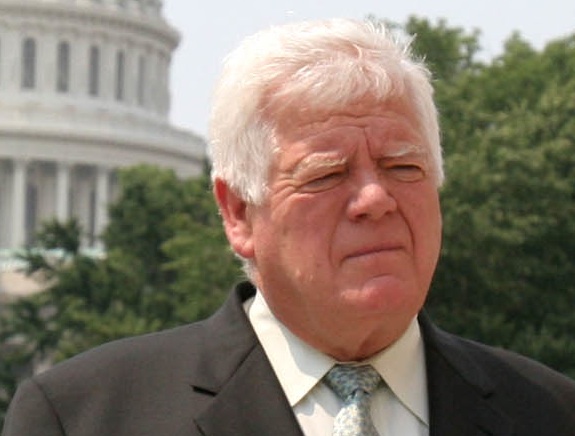Study: Millions to Prematurely Lose Unemployment Benefits
Because of the tiered nature of the various extensions -- and because beneficiaries must exhaust one tier before applying for the next -- the year-end deadline would prevent many eligible families from filing for the next level of benefits.
Jul 31, 2020185.8K Shares5.3M Views
Rep. Jim McDermott (D-Wash.) (WDCpix)
For millions of unemployed workers, the recession is poised to go from bad to worse.
More than 3.2 million laid-off Americans will prematurely exhaust their unemployment insurance in the first quarter of next year unless Congress intervenes, an advocacy group warnedMonday.
Although lawmakers last month pushed through a new extension of emergency jobless benefits, the underlying program authorizing those payments expiresat the end of December. The deadline threatens to leave millions of families dangling without income, even in cases when they’re otherwise eligible to receive additional assistance.
[Congress1] The looming threat is prompting state labor officials to call on Congress to extend the jobless benefits program before lawmakers leave town for the year-end recess — a move Democratic leaders have been eyeing for weeks.
“If Congress does not recast this lifeline by renewing these provisions without delay, our most vulnerable citizens — already hardest hit by the recession — will be left with no ability to pay their bills, heat their homes and feed their families,” saidSandi Vito, secretary of the Pennsylvania Department of Labor & Industry.
The push arrives just weeks after President Obama signed into law a bill extending jobless benefits for 14 weeks nationwide, with an additional six weeks going to residents in those states where unemployment rates top 8.5 percent. It marked just the latest in a series of benefit extensions dating back to the Bush administration. The underlying program was last authorized through Dec. 31 by the economic stimulus bill. Yet, because of the tiered nature of the various extensions — and because beneficiaries must exhaust one tier before applying for the next — the year-end deadline would prevent many eligible families from filing for the next level of benefits.
Hardest hit would be California, where the filing deadline threatens to drop nearly 589,000 beneficiaries in the first three months of next year, according to the analysis, conducted by the National Employment Law Project (NELP), an advocacy group. Other states in line to suffer the greatest drop-offs are Florida (314,000), New York (239,000), Texas (196,000), Illinois (193,000) and Michigan (183,000). Ten states are facing dropped enrollment topping 100,000 beneficiaries, NELP found.
The deadline threatens to shift much higher costs onto states, squeezing budgets at the same time that states are least able to shoulder the addition burden. The NELP analysis is designed to hike the pressure on Congress to offer additional federal help.
The Labor Department last week providedsome reason to be hopeful, releasing figures indicating that employers shed just 11,000 jobs in November — down from an average of 135,000 each month in the previous quarter. Still, economists and federal officials have both warned that the figure, while an enormous improvement, is no indication that employers are readying a hiring spree. Chad Stone, chief economist at the liberal Center on Budget and Policy Priorities, pointed out that long-term unemployment numbers continued to rise in November, though the jobless rate slightly fell.
“A labor market recovery that puts unemployed workers back to work requires faster growth and a much greater pace of new hires than is yet evident,” Stone saidin a statement last week. “We estimate that without additional federal assistance, state actions to close their projected budget deficits could cost the economy 900,000 jobs next year.”
Democrats have the problem on their radar. Last month, the office of Sen. Harry Reid (D-Nev.) acknowledgedthat Congress would have to tackle the deadline glitch before year’s end. More recently, House Majority Leader Steny Hoyer (D-Md.) said that extending unemployment benefits is “critically important to keeping Americans from falling right through the bottom of the barrel.”
“They are still hurting,” Hoyer told reporters last week, “but [the emergency help] was of great assistance to them. We need to revisit that, obviously, before the end of the year.”
In the House, Rep. Jim McDermott (D-Wash.) has been the champion of extending the jobless benefits. In a recent letter to chamber colleagues, the Washington liberal pointed out that the jobless benefits not only provide a safety net, but also stimulate the economy. “Every dollar spent on unemployment benefits generates a $1.64 increase in economic activity,” McDermott wrote.
There is controversy, however, over how to pay the tab of a benefits extension, with conservatives already calling on the administration to tap unspent stimulus funds to cover the costs, which will be considerable. McDermott’s office has estimated that a one-year extension would cost roughly $80 billion.
Congress is also eyeing another stimulus bill, which would provide an obvious vehicle for the unemployment extension. But with the Senate likely to be bogged down with health care reform for much of the month, some Hill observers say it’s more likely that the unemployment extension would ride alongside a less contentious legislative vehicle.
It’s uncertain, McDermott’s office said Monday, whether a new jobs bill could pass before the end of the year.

Dexter Cooke
Reviewer
Dexter Cooke is an economist, marketing strategist, and orthopedic surgeon with over 20 years of experience crafting compelling narratives that resonate worldwide.
He holds a Journalism degree from Columbia University, an Economics background from Yale University, and a medical degree with a postdoctoral fellowship in orthopedic medicine from the Medical University of South Carolina.
Dexter’s insights into media, economics, and marketing shine through his prolific contributions to respected publications and advisory roles for influential organizations.
As an orthopedic surgeon specializing in minimally invasive knee replacement surgery and laparoscopic procedures, Dexter prioritizes patient care above all.
Outside his professional pursuits, Dexter enjoys collecting vintage watches, studying ancient civilizations, learning about astronomy, and participating in charity runs.
Latest Articles
Popular Articles
